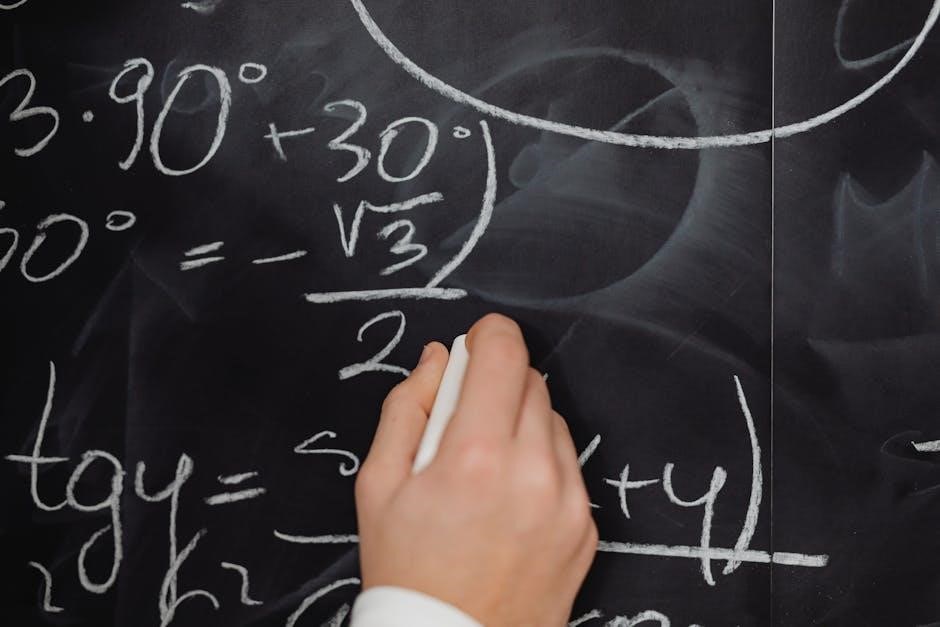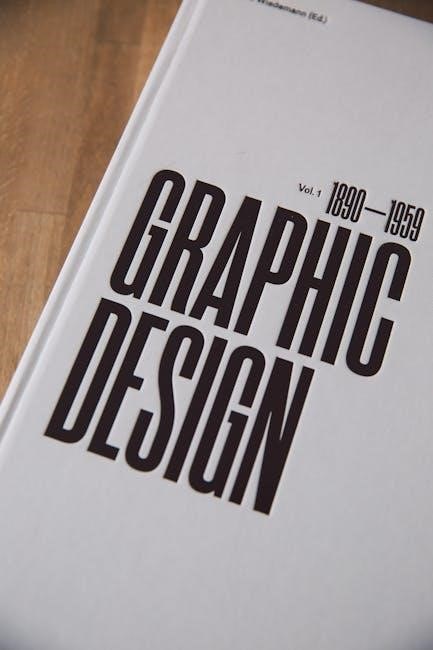Year 6 maths worksheets in PDF format provide comprehensive practice for students aged 10-11, covering key topics like fractions, decimals, and ratios to build confidence and skills.
Overview of Year 6 Maths Curriculum
The Year 6 maths curriculum is designed to build on foundational skills and introduce more complex concepts, preparing students for higher-level mathematics. It covers a wide range of topics, including number and place value, addition, subtraction, multiplication, and division, with a focus on mental maths and problem-solving strategies. Fractions, decimals, and ratios are explored in depth, along with probability, geometry, and measurement. Students also learn to handle money, tell time, and interpret data, developing practical skills for real-world applications. The curriculum emphasizes critical thinking and logical reasoning, ensuring students can apply mathematical concepts confidently. Worksheets and practice materials, such as those from White Rose Maths and CBSE, provide structured exercises to reinforce learning and mastery of these essential skills.
Importance of Worksheets in Maths Education
Worksheets play a vital role in maths education, offering structured practice to reinforce learning. They provide students with consistent opportunities to apply concepts, ensuring fluency and confidence. For Year 6 students, worksheets are especially valuable as they transition to more complex maths, helping to bridge gaps between topics. Regular use of worksheets improves problem-solving skills and mental maths abilities, which are crucial for success in higher-level mathematics. Additionally, worksheets allow for independent practice, enabling students to identify areas where they need extra support. They also serve as a tool for teachers to assess understanding and progress. With resources like Year 6 maths worksheets in PDF format, students can access high-quality materials anytime, making learning flexible and efficient. Worksheets are an essential part of a comprehensive maths education strategy.
Benefits of Using PDF Worksheets
PDF worksheets offer numerous benefits for Year 6 maths education, making them a popular choice among educators and parents. They are easily accessible and can be downloaded instantly, providing convenience for home study or classroom use. PDFs are also cost-effective, as they eliminate the need for physical copies, reducing printing costs. Additionally, they are environmentally friendly, as students can complete exercises digitally without wasting paper. PDF worksheets are compatible with all devices, allowing students to practice maths anywhere, anytime. They also maintain consistent formatting, ensuring clarity and readability. Furthermore, PDFs are shareable, making it easy for teachers to distribute resources to students or parents. This format supports flexible learning and helps students develop maths skills in an organized and efficient manner, fostering better academic outcomes.

Key Topics Covered in Year 6 Maths Worksheets
Year 6 maths worksheets cover a variety of essential topics, including number operations, fractions, geometry, and data handling. They provide a comprehensive learning experience, helping students build a strong foundation in maths.
Number and Place Value
Number and place value are fundamental concepts in Year 6 maths, focusing on understanding the value of digits within numbers. Worksheets cover reading, writing, and comparing numbers up to millions, including decimals and negative values. Students learn to round numbers to the nearest thousand and solve problems involving place value charts. Activities also include identifying the number of digits, thousands, and units in a given number. These exercises help build a solid foundation for more complex operations like algebra and problem-solving. By practicing with varied question types, students gain confidence in manipulating and interpreting numerical data, preparing them for advanced maths topics in higher grades.

Worksheets often include real-world applications, such as calculating money or measuring lengths, to make learning engaging and relatable. This ensures students can apply their knowledge effectively in practical scenarios.
Addition and Subtraction

Addition and subtraction are core skills refined in Year 6 maths worksheets. Students practice adding and subtracting large numbers, including four-digit numbers and decimals, to improve accuracy and speed. Worksheets often include word problems, requiring the application of these operations in real-life scenarios. Mental maths strategies are also emphasized, helping students develop quick calculation methods. Activities include solving missing number problems and verifying calculations using inverse operations. These exercises strengthen problem-solving abilities and logical thinking. Additionally, worksheets incorporate timed drills to build fluency and confidence. By mastering these fundamentals, students lay a strong foundation for more complex arithmetic and algebraic concepts in later years. The focus is on precision and understanding, ensuring students can apply their skills effectively in various mathematical contexts.
Multiplication and Division
In Year 6 maths worksheets, multiplication and division are extensively practiced to enhance students’ arithmetic fluency. Worksheets focus on multiplying and dividing larger numbers, including multi-digit calculations and mental maths strategies. Students learn efficient methods for long multiplication and division, ensuring accuracy and understanding. Activities include solving word problems, such as sharing quantities equally or calculating costs, to apply these operations in real-world contexts. The use of visual aids like arrays and number lines helps reinforce concepts. Additionally, worksheets introduce more complex scenarios, such as dividing decimals or multiplying mixed numbers, to challenge students. These exercises build problem-solving skills, logical reasoning, and confidence in handling numerical operations. Mastering multiplication and division at this stage is crucial for progressing to algebra and higher-level mathematics.
Fractions and Decimals
Year 6 maths worksheets emphasize mastering fractions and decimals, essential for building a strong foundation in numeracy. Students learn to simplify fractions, identify equivalent fractions, and add or subtract fractions with common denominators. Worksheets also cover multiplying and dividing fractions by whole numbers and other fractions. Converting between improper fractions and mixed numbers is a key focus, alongside understanding decimal place value up to three decimal places. Activities include comparing and ordering fractions and decimals, as well as solving real-world problems involving money, measurements, and ratios. Visual aids like pie charts and number lines are often used to help students visualize these concepts. These exercises improve mental maths skills and prepare students for more complex topics like algebra and geometry in later years.
Ratio and Probability
Year 6 maths worksheets delve into ratios and probability, introducing students to foundational concepts. Worksheets focus on understanding ratios as comparisons of quantities, learning to express them in simplest forms, and applying them to real-life scenarios like recipes or mixing materials. Probability lessons cover basic concepts, such as identifying outcomes, calculating likelihood, and understanding fairness in games. Activities include creating probability scales, determining chance events, and solving word problems. Visual aids like tables, Venn diagrams, and probability scales are used to enhance understanding. These exercises help students develop logical reasoning and problem-solving skills, preparing them for more advanced statistical concepts in higher grades. Practice questions also encourage critical thinking and accurate calculation, making these topics engaging and accessible for young learners.
Shape, Angles, and Measurement
Year 6 maths worksheets emphasize the study of shapes, angles, and measurement to build foundational geometry skills. Worksheets explore properties of 2D and 3D shapes, including triangles, quadrilaterals, and polygons, focusing on symmetry, congruence, and angles. Students learn to identify and calculate angles within shapes, understanding concepts like acute, obtuse, right, and straight angles. Measurement topics include calculating perimeter, area, and volume, as well as converting units of length, capacity, and weight. Practical problems, such as measuring room dimensions or calculating distances, help apply these skills. Visual aids like diagrams and grids are included to aid understanding. These exercises develop spatial awareness and problem-solving abilities, essential for advanced geometry and real-world applications; Interactive activities make learning engaging and effective for young students.
Time and Money Handling
Year 6 maths worksheets focus on refining time-telling skills, including reading analogue and digital clocks to the nearest minute. Students learn to calculate durations, intervals, and schedules, ensuring a strong grasp of time management. Money handling involves understanding coin and note values, adding and subtracting money, and calculating change; Worksheets include problems like budgeting, shopping scenarios, and price comparisons to apply maths in real-life contexts. These exercises develop practical skills essential for everyday situations, such as telling time accurately and managing finances wisely. Interactive activities make learning engaging and relevant, preparing students for independence in time and money matters.

Data and Number Problems
Year 6 maths worksheets emphasize the interpretation and analysis of data presented in various forms, such as bar charts, line graphs, and pictograms. Students are encouraged to extract and compare information, developing their ability to draw conclusions and make informed decisions. Number problems involve multi-step calculations, requiring the application of arithmetic operations to solve real-world scenarios. These exercises enhance problem-solving skills and logical thinking, fostering a deeper understanding of numerical relationships. Worksheets often include word problems that integrate concepts like money, time, and measurement, reinforcing maths in practical contexts. By tackling these challenges, students build confidence in handling complex data and applying maths to everyday situations, preparing them for higher-level problem-solving in the future.

Interactive and Engaging Features of Worksheets
Engaging Year 6 maths worksheets feature puzzles, quizzes, and games to make learning enjoyable. Interactive elements like drag-and-drop activities and visual diagrams enhance understanding, fostering a love for maths.
Interactive Elements to Enhance Learning
Year 6 maths worksheets in PDF format often incorporate interactive elements to make learning dynamic and engaging. These include puzzles, quizzes, and colour-coded exercises that cater to different learning styles. Drag-and-drop activities allow students to visualize problems, while fill-in-the-blank sections test recall and accuracy. Visual aids, such as charts and diagrams, simplify complex concepts like fractions and decimals. Gamified tasks, such as maths bingo or problem-solving mazes, encourage healthy competition and teamwork. These features not only make learning fun but also help students develop problem-solving skills and critical thinking. Interactive elements ensure that students stay motivated and actively participate in their maths journey, fostering a deeper understanding of key topics. By blending creativity with education, these worksheets create a balanced and effective learning experience.
How Worksheets Improve Student Engagement
Year 6 maths worksheets in PDF format are designed to captivate students’ interest and maintain their focus. By presenting concepts in a clear and structured manner, worksheets help students feel more confident in tackling maths problems. The variety of exercises, such as word problems, puzzles, and real-world applications, keeps learning fresh and exciting. Worksheets also allow students to track their progress visually, providing a sense of accomplishment as they complete tasks. This tangible feedback motivates students to persist and improve their skills. Additionally, worksheets cater to different learning styles, ensuring that all students can engage with the material in a way that suits them best. Regular practice with worksheets fosters a growth mindset, encouraging students to view challenges as opportunities to learn and grow.

Resources and Worksheets for Year 6 Maths
Explore a wide range of Year 6 maths worksheets in PDF format, offering structured practice for key topics like number, fractions, and geometry. Free resources available online provide comprehensive coverage of the curriculum, ensuring students can revise and master essential skills. Reputable sources include White Rose Maths, SATs revision booklets, and CBSE-aligned materials, catering to diverse learning needs. These worksheets are designed to support both classroom learning and independent study, making maths practice accessible and engaging for all students.
Free Year 6 Maths Worksheets in PDF Format
Free Year 6 maths worksheets in PDF format are an excellent resource for students and teachers, offering a comprehensive way to practice and revise key maths skills. These worksheets cover a wide range of topics, including number operations, fractions, geometry, and ratio, ensuring a thorough understanding of the curriculum. Designed to be user-friendly, they are easily downloadable and printable, making them ideal for classroom use or home study. Many resources include answer keys, allowing students to self-assess their progress. Parents and educators can use these worksheets to provide structured practice, reinforcing concepts learned in school. Best of all, they are freely available online, making high-quality maths education accessible to everyone. These worksheets are a valuable tool for helping students build confidence and fluency in their maths abilities.
White Rose Maths Worksheets for Year 6
White Rose Maths worksheets for Year 6 are highly regarded for their structured and progressive approach to maths education. Aligned with the UK curriculum, these resources are designed to support both teachers and students in mastering key maths concepts. The worksheets are divided into topics such as number, fractions, geometry, and algebra, ensuring a comprehensive understanding. They are known for their clarity and accessibility, making complex ideas easier for students to grasp. Many of these worksheets are available in PDF format, offering a convenient and printable solution for classroom or home use. White Rose Maths is widely trusted for its high-quality materials, which cater to diverse learning needs and help students build a strong foundation in maths.
SATs Revision Practice Booklets
SATs revision practice booklets are essential resources for Year 6 students preparing for their end-of-year assessments. These booklets are specifically designed to cover the maths curriculum tested in SATs, ensuring students are well-prepared for the exam format and content. They typically include a wide range of practice questions, past papers, and revision exercises that focus on key areas such as arithmetic, reasoning, and problem-solving. The booklets often feature timed sections to help students manage their time effectively during the actual test. Many SATs revision practice booklets also include answer keys, allowing students to review their work and identify areas for improvement. These resources are available in PDF format, making them easily accessible for both home and classroom use. They are a valuable tool for targeted revision and confidence-building before the exams.
CBSE Class 6 Maths Practice Worksheets
CBSE Class 6 Maths practice worksheets are tailored to the Central Board of Secondary Education curriculum, offering comprehensive coverage of key topics. Designed for students in Year 6, these worksheets focus on concepts such as integers, fractions, decimals, algebra, and geometry. They also emphasize mental maths, problem-solving, and logical reasoning skills. The worksheets are structured to align with the CBSE syllabus, ensuring students grasp foundational maths concepts thoroughly. Available in PDF format, they are easily accessible and convenient for both home and classroom use. Regular practice with these worksheets helps students build confidence, improve accuracy, and develop a strong understanding of maths. They are an excellent resource for reinforcing learning and preparing for school assessments and competitive exams.
Maths Workbook for Primary Mathematics

A Maths Workbook for Primary Mathematics is an essential resource for Year 6 students, offering a structured approach to learning and practising key maths skills. These workbooks are designed to complement the curriculum, providing a wide range of exercises that cater to different learning styles. They cover topics such as number operations, geometry, data handling, and problem-solving, with a focus on building fluency and understanding. Interactive features like puzzles, word problems, and visual aids make learning engaging and fun; The workbooks are progression-based, starting with basic concepts and gradually introducing more complex ideas. Regular practice with these materials helps students develop confidence, accuracy, and critical thinking abilities. They are ideal for both classroom use and independent study, ensuring a solid foundation in maths for future success.

Additional Support Materials
Additional support materials, such as homework sheets, practice questions, and answer keys, enhance Year 6 maths learning. These resources aid revision and transition to higher grades effectively.

Homework Sheets and Practice Questions
Homework sheets and practice questions are essential for reinforcing Year 6 maths skills. These resources provide structured exercises that cover topics like number operations, fractions, and geometry. They allow students to apply concepts learned in class, building confidence and fluency. Practice questions are designed to cater to different learning paces, ensuring each student can grasp key ideas. Many worksheets include problem-solving exercises and word problems, promoting critical thinking. Regular practice helps students identify strengths and weaknesses, enabling targeted revision. Homework sheets also serve as valuable tools for parents and teachers to monitor progress and provide feedback. With varied formats, including timed drills and mixed-topic reviews, these materials ensure comprehensive preparation for exams and real-world applications.
Answer Keys and Solutions
Answer keys and solutions are indispensable companions to Year 6 maths worksheets, offering clear guidance for students and educators. These resources provide correct answers to exercises, enabling students to self-assess their work and identify areas for improvement. Detailed solutions often include step-by-step explanations, helping learners understand problem-solving strategies and correct common errors. Teachers benefit from these tools as they save time during grading and provide targeted feedback. Answer keys and solutions support independent learning, allowing students to review and master concepts at their own pace. They also ensure accuracy and consistency in marking, building confidence in both students and parents. With these materials, Year 6 maths becomes more accessible, fostering a deeper understanding and preparing students for future challenges.
Revision and Transition Day Activities
Revision and transition day activities are designed to reinforce learning and prepare students for the next academic level. These activities often include practice exercises, puzzles, and team-based tasks that focus on key maths topics. They help students review and consolidate their understanding of concepts like fractions, decimals, and geometry. Transition activities also introduce elements of the next year’s curriculum, easing the move to more complex maths. Interactive games and group work encourage collaboration and problem-solving. These resources are particularly useful for Year 6 students, bridging gaps and building confidence. They ensure a smooth transition while keeping learning engaging and fun. Regular use of these activities helps students feel prepared and motivated for future challenges.
